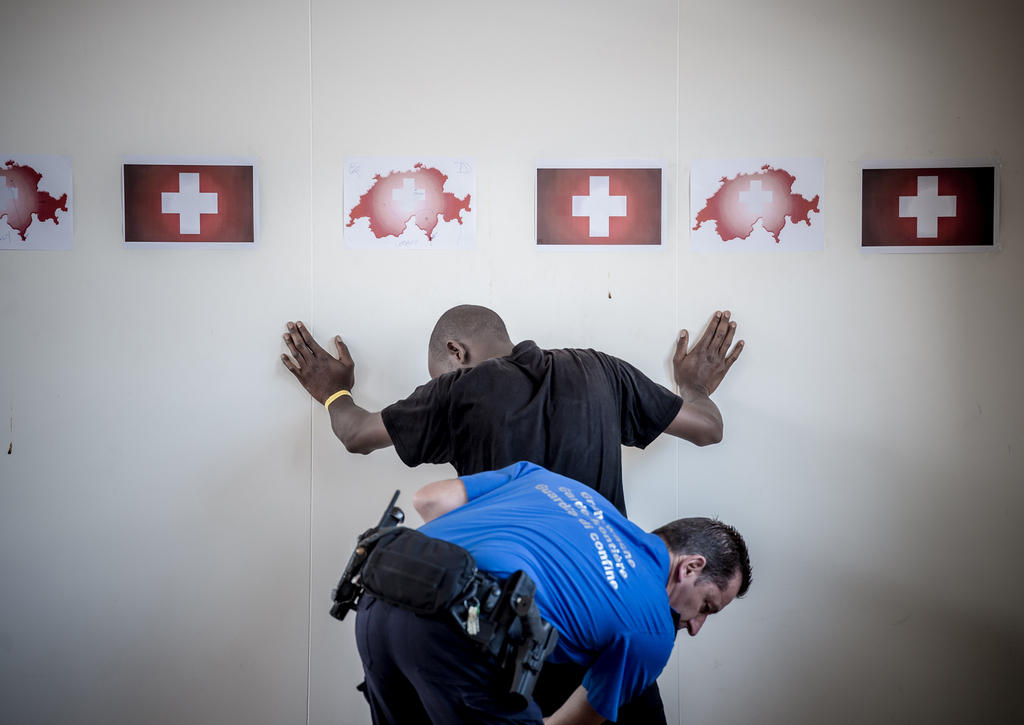Eritreans stuck in Switzerland lose faith in a better future

Thousands of failed asylum seekers cannot be sent back and refuse to return home voluntarily. Many continue to live in Switzerland with emergency assistance, with no prospect of a future. Young Eritreans share their stories.
Mewael* lives in Geneva on CHF10 (around $10) a day. He is not allowed to train or work. To occupy his days, he plays football, does small jobs at the reception centre where he lives or cooks at a local charity. He is among thousands of people who have not been granted asylum, but who cannot return home and find themselves trapped in Switzerland. In 2017, more than 8,000 people received emergency assistance, mostly in the form of shelter or food.
Mewael is in his twenties. He fled Eritrea and arrived in Switzerland almost three years ago. He filed his asylum application and learned French while waiting for the decision that came through only two years later. His application was rejected and Mewael had to leave the country. He has appealed the decision and is clinging to the slim hope of a positive answer. The young man aspired to an apprenticeship as an electrician or mechanic, but no longer sees the merit in that.
“Life is complicated in Switzerland,” sighs his friend Samson. “It’s not complicated, it’s dead,” interjects Mewael, tears in his eyes.
Removal ordered but not executed
Eritreans are particularly vulnerable to such situations because the Swiss government has not signed a readmission agreement with Eritrea. It cannot therefore forcibly expel the unsuccessful applicants. “At the international level, Switzerland stands out by issuing removal decisions: no European State carries out expulsions to Eritrea,” says a very detailed report by the Observatory of the rights of asylum and foreigners in French-speaking Switzerland (ODAE)External link on the pressures faced by the Eritrean community.
Samson has already been in Switzerland for four years. The inability to work adds to his suffering.
“I am stuck, I don’t know what to do. It’s very stressful,” he tells swissinfo.ch.
To get out of this situation, some have tried to apply for asylum in another country. Yonas went as far as Germany, but was sent back to Switzerland because of the Dublin agreement. He has also been in Switzerland for four years and dreams of becoming a mechanic, gardener or even a lawyer. “When I left home, I thought my problems were over, but in fact they followed me here,” Yonas says.
All these young Eritreans speak French, but can no longer find the words when they talk about their life in Switzerland and their future prospects. “I feel bad, I have problems sleeping and concentrating,” says Robel, who has been in Geneva for two years. “Here I thought I would find happiness, freedom, and I found nothing.”
Impossible to get back
When they inform unsuccessful applicants of their obligation to leave Switzerland, the authorities offer them return assistance, but none of the Eritreans swissinfo.ch spoke to have plans to return.
Eritrea is not a safe place for its citizens, according to the United Nations (UN).
“Eritrean officials have been attacking civilians in a persistent, widespread and systematic manner since 1991. Since then, they have consistently committed crimes of slavery, imprisonment, enforced disappearance and torture, as well as other inhuman acts, persecution, rape and murder.”
“We don’t come here for money, we’re just looking for freedom.”
Hayat wants to tell us what happened to him. He explains that in his country, everyone must serve in the army for an indefinite period. The population is not free to train or work as they wish. And many people vanish into thin air, without families ever being informed of their imprisonment or death.
Hayat’s father disappeared in this fashion. And Hayat found himself in prison when he was only 16-years-old. He was beaten, tied up and locked in a cage. During a transfer, the young man managed to escape and cross Sudan, Libya and finally the Mediterranean. Initially, they were a group of 25 people. Only three of them reached Italy.
“We don’t come here for money, we’re just looking for freedom,” says Hayat, who has just received good news: his appeal has been successful, and he has been granted temporary admission. The young man will be able to continue his training with an electrician, something he would have had to give up overnight had the decision been negative. It is a bittersweet victory given that all his friends are still waiting for a court decision or have been definitively rejected.

A “Kafkaesque” system
“It’s complicated for them, because at first they find a haven of peace and then they are told they have to leave,” says a volunteer who tries to help these young people but feels powerless in the face of a fragmented system. “There is no global vision of the person, everything is always divided: there is one person responsible for care, another for housing, etc. The responsibility is always shifted to another department and it becomes Kafkaesque.”
Temporary admission would at least allow applicants with a negative asylum decision to receive training and work. However, it can only be issued if the removal is contrary to Switzerland’s commitments to international law. In other words, if it puts the individual in danger, or if it is not physically feasible to carry out the decision.
“Failed Eritrean asylum seekers who are subject to a removal decision are legally obliged to leave Switzerland,” explains the State Secretariat for Migration (SEM).” Forced removals are not currently possible, but voluntary returns are.”
“Forced removals are indeed not possible, but voluntary returns are”
The SEM therefore considers that it would be wrong to give provisional admission to individuals who refuse to leave the country, simply because Switzerland cannot make a forced return. “This would reward people who, from the outset, make it clear that they will not comply with their obligation to leave the country, even though they do not need Swiss protection and would be forced to leave.”
Limited support
The SEM explains that an individual who decides to stay despite everything is no longer entitled to social assistance, but only to emergency assistance. The objective is “to ensure that the persons concerned voluntarily comply with their obligation to leave Switzerland by no longer providing material incentives to stay. ”
The cantons are responsible for providing emergency assistance and managing these unsuccessful applicants. Cantons cannot do much for this population, which cannot work or receive training. “It’s complicated to stay positive and keep these young people motivated,” says a social worker in Geneva.
A conference on the issue of training rejected asylum seekers was held in early February in Lausanne. Apprentices, employers, asylum professionals and teachers called on the cantonal and federal authorities to allow young people to complete their training, even in the event of a negative asylum decision.
Signatures are also being collected in Geneva for an online petition that asks the canton not to exclude Eritrean asylum seekers from social assistance and to allow them to train and work.
More restrictive asylum policy
However, the trend towards a tightening of asylum policy at federal level in recent years does not seem to be coming to an end. In 2016, the SEM published a new report on the situation in Eritrea and carried out a review, confirmed by recent decisions of the Federal Administrative Court. Judges now consider that Eritrean asylum-seekers can be sent back to their country, even if they risk being recruited into the army upon their return. The SEM has undertaken a review of more than 3,000 files of Eritrean applicants with temporary admission to assess whether a removal is required.
Migrant advocacy groups and the Eritrean community are mobilising against this tougher stance. A demonstration of 1,500 people took place last May in front of the parliament in Bern and a petition with more than 12,000 signatures was submitted for asylum to be granted with immediate effect to anyone threatened with ill-treatment. But the Senate refused to act on this petition because it overwhelmingly supporters the harder line taken by SEM.
*Name chosen by journalist to preserve anonymity.

In compliance with the JTI standards
More: SWI swissinfo.ch certified by the Journalism Trust Initiative













You can find an overview of ongoing debates with our journalists here . Please join us!
If you want to start a conversation about a topic raised in this article or want to report factual errors, email us at english@swissinfo.ch.